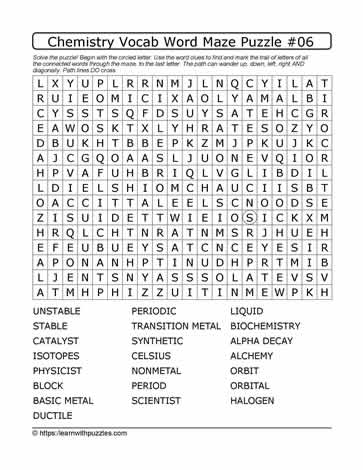Chemistry Vocab Word Maze #06( |
Here is an interactive and challenging academic chemistry word maze puzzle to support students in academic chemistry grades 9-12 and home schooling environments. Puzzle includes a list of 25 word clues, whose letters paths meander through the word search grid, creating a maze like effect. Trace the letter paths from beginning to the end, starting at the circled letter.
Solve the puzzle:
l. FIRST, review the complete list of 25 words to 'engage' the brain
2. REMEMBER: letter paths travel vertically, horizontally, forwards, backwards and diagonally
3. NEXT, trace the paths from the circled letter to the end
3. NOTE: letter paths DO cross
4. FINALLY, track progress by checking off the words
Lesson plan resource ideas:
1. get students to create their personal word searches using any number of academic chemistry words [blank word searches link, below]
2a. create additional problem solving strategy activities by having students make connections between lists of chemistry words and elements of the periodic table [other puzzles found here: Chemistry-Periodic Table puzzles]
2b. here are some ideas: 1) students organize information between the two word lists using any number of criteria (by period, by vocabulary related to structure, atomic weight ranges, stability, ability to form bonds, etc), 2) have students create matching puzzles or games for others to play/solve using list of chemistry vocabulary and the list of periodic table of elements, 3) encourage students to spell the chemistry vocabulary using periodic table symbols [e.g. using the elements: Carbon, Argon, Boron, Oxygen and Nitrogen, spell the word: C A R B O N; or could C A R B O N be spelled using different symbols?] 4) investigate how many different ways chemistry vocabulary can be spelled using symbols from the periodic table
Blank word search link here: blank word searches.
Why are puzzles important? Use puzzles to:
1. engage critical thinking skills
2. activate problem solving skills
3. engage the brain
4. help improve memory
5. support brain health
6. consolidate spelling of the more challenging academic words
7. support visual acuity

